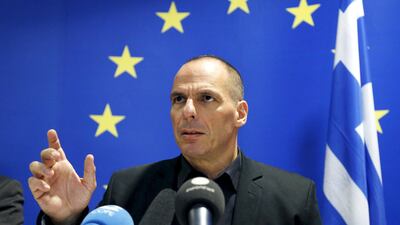Athens // Syntagma square erupted into a street party on Sunday night as Greece’s referendum results put the No camp officially in the lead.
Revellers stayed out until the small hours waving Greek and Syriza party flags, hugging each other and cheering. In a race that was too close to call according to official polls, the No camp stormed ahead with 61 per cent of the vote.
In light of the results, the opposition New Democracy leader Antonis Samaras – the former prime minister of Greece until he was deposed in this January’s elections and the man who presided over some of Greece’s harshest austerity cuts – tendered his resignation.
Addressing the country, prime minister Alexis Tsipras, who called the referendum on June 29, said: “You made a very brave choice. The mandate you gave me is not the mandate of a rupture with Europe, but a mandate to strengthen our negotiating position to seek a viable solution.”
Another high-profile regination came Monday morning when the finance minister Yanis Varoufakis announced he was quitting. Mr Varoufakis had threatened to resign a few days before, but only if the vote had favoured the Yes side.
In a blog post, the minister, whose renegade style of negotiating ruffled many feathers in Brussels, said that his resignation was in part to do with “some European participants” expressing a desire for him not to be involved in any further negotiations. His replacement has yet to be announced.
The streets of Athens outside the centre were deserted as people stayed home to follow the results as they filtered in. By night time, long queues had formed at ATMs as worried citizens tried to withdraw their allocated €60 for the day, some hovering by ATMs waiting for the clock to strike midnight and withdraw the same amount again.
Capital controls have been in place since June 29 to stem a haemorrhage of withdrawals from the Greek banking system.
Pensioners have been hit hardest by the measures, with many still relying on bank books rather than cards to withdraw money. Limited bank branches opened during the week for them to withdraw €120, causing anguished and tears of frustration among the elderly waiting in line. Volunteers have been distributing bottled water in cities across Greece to pensioners as they queue for their turn.
On Monday, as in the days preceding the referendum, the debate has been dedicated to what a No vote means in real terms. In the rest of Europe, the news of the Greek No vote was received with disappointment. If Greeks hoped to send a message to their creditors that would soften their stance, so far it does not appear to be forthcoming.
The Eurogroup president and Dutch finance minister Jeroen Dijsselbloem said: “I take note of the outcome of the Greek referendum. This result is regrettable for the future of Greece.”
The president of the European parliament, Martin Schulz, responded by saying: “This is a difficult day.”
He went on to remind the Greek government that because Greece had turned down Europe’s measures, it now had to convince 18 other member states of the merit of its own proposal.
The impact of the No vote was immediately apparent in stock markets around the world as the uncertain financial implications of the decision sent stocks falling. Markets across Europe opened lower. Yields on Spanish, Italian and Portuguese government bonds climbed steadily as contagion from a possible Greek exit spread. The euro lost ground to every major currency as the result was announced, which it went on to recover immediately after the announcement of Mr Varoufakis’ resignation.
Markets across Asia also fell, aside from mainland Chinese shares. The mood among investors has been negative, but not yet panicked.
The European Central Bank will meet on Monday to discuss the possibility of a liquidity lifeline to Greek banks, which have been shut since June 29.
The German chancellor Angela Merkel and the French president Francois Hollande are due to meet in Paris on Monday night. An emergency Eurogroup meeting to discuss Greece’s precarious financial situation is scheduled for Tuesday.
Meanwhile, the headache is setting in after the party as Greece wonders what comes next.
business@thenational.ae
Follow The National's Business section on Twitter

